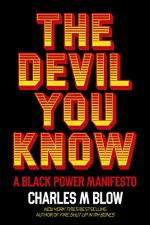|
This section contains 577 words (approx. 2 pages at 400 words per page) |

|
The Devil You Know: A Black Power Manifesto Summary & Study Guide Description
The Devil You Know: A Black Power Manifesto Summary & Study Guide includes comprehensive information and analysis to help you understand the book. This study guide contains the following sections:
This detailed literature summary also contains Topics for Discussion on The Devil You Know: A Black Power Manifesto by Charles M Blow.
The following version of this book was used to create this study guide: Blow, Charles M. The Devil You Know: A Black Power Manifesto. New York: HarperCollins, 2021.
In this book, journalist Charles M. Blow discusses racism in America, specifically in the context of a proposed path forward for the enactment of racial justice. Blow begins by discussing the anti-racism protests that followed the murder of George Floyd. Most of the participants in these protests were white people. By the time the protests lost momentum, they achieved virtually no actual progress towards racial justice. Racial justice efforts by white Americans have consistently proven ineffectual, while racial justice efforts by Black Americans—such as Stacey Abrams’ push to register voters of color in Georgia—have produced actual results.
Blow’s proposal to increase Black political power in the United States is for as many Black people in Northern and Western states to move to states in the South. In the decades following the Civil War, many Black Americans migrated to the North in search of economic opportunity, as well as in hoping to escape racial persecution. However, racism in the North has proven to be as egregious as in the South. Currently, the largest Black communities are in Southern states. If Black Americans in the North and West relocated to the South, the Black Americans would have substantially more representation in government, both on the state and national level. Additionally, these Black communities would allow Black Americans to exert more control over their own lives in the spheres of government, economics, et cetera.
Blow addresses some of the objections that people have raised to his plan. For example, some people have raised the concern that his plan is pro-segregationist. Blow points out that racial segregation is already rampant in all parts of the United States thus, his plan would not increase segregation. It would only increase Black political power. Other people have argued that it is sufficient to approach racial justice more passively, as gradual progress and demographic shifts in the country will remedy racial oppression. However, Blow argues that the gradually shifting demographics of the country will only have the effect of replacing racism with a hierarchy of colorism that is equally unjust.
Blow addresses the idea of gradual or passive progress by demonstrating how such philosophies have failed to produce positive results in the past. One example Blow uses is that of Booker T. Washington, who was a civil rights leader in the second half of the nineteenth century. Washington advocated for the idea that, if Black people simply focused on education and developing trade skills, then white people would have no choice but to value Black Americans’ worth and humanity. However, Blow notes that white American culture has generally remained resistant to pursuing any active progress towards social justice. Blow points out that there is no correlation between white liberalism and anti-racism.
Blow reiterates the need for Black Americans to undertake decisive collective action in order to secure any substantial progress in the sphere of racial justice. Blow ends the book by stating that, if any Black readers of this book live in the North and the West and feel truly happy and fulfilled, then they should remain where they are. However, if they do not feel fulfilled, safe, and protected, then they should migrate to the South and become part of a movement to secure the safety and human dignity of Black Americans.
Read more from the Study Guide
|
This section contains 577 words (approx. 2 pages at 400 words per page) |

|



